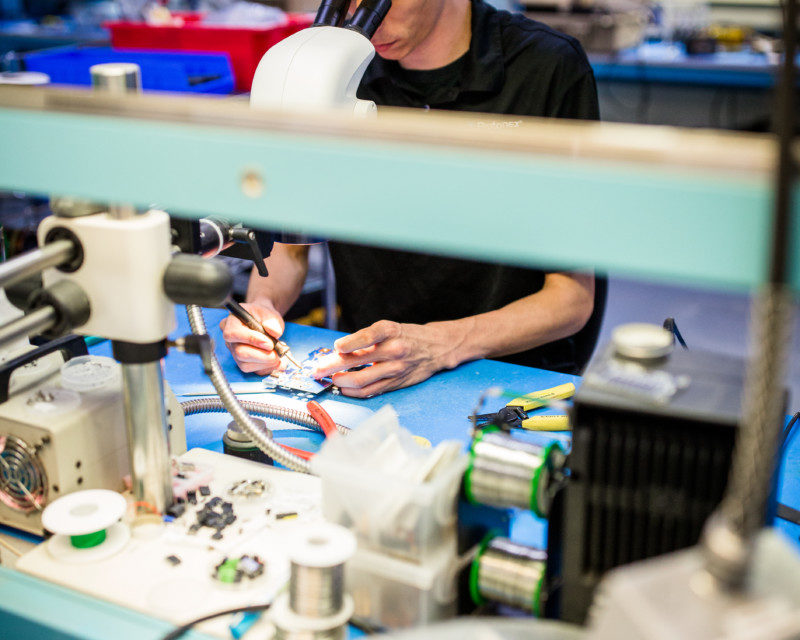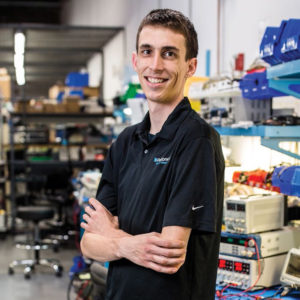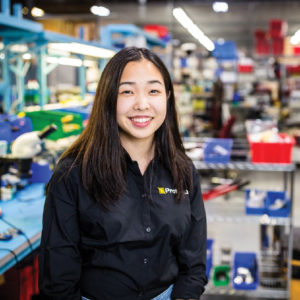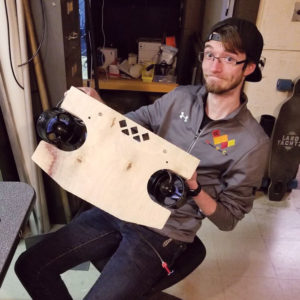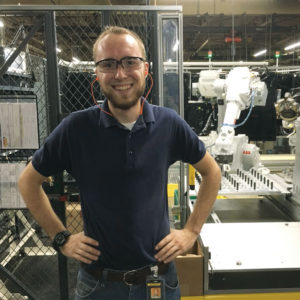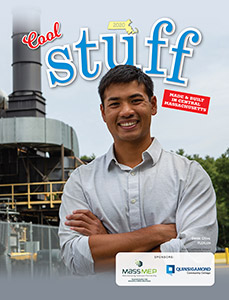Companies wanting to try out employees give young workers
the chance to develop
At 25, Robbie Allred has done a lot different jobs. He’s worked in restaurants and as a park ranger, and served in the Marine Corps for four years. But becoming a paid intern at Protonex Technology Corp. in Southborough set him on a course he’s been dreaming about for a long time.
Robbie Allred, 25
Electrical engineering technician, former electrical engineering intern
Protonex Technology Corp. in Southborough
Lives: Fitchburg
Makes: Portable power solutions
Career aspirations: Work on space systems, including rovers
Pay: Industry standard for co-op students
“Most of my life, I’ve always been a science nerd and a space nerd,” Allred said.
So, when one of his professors at Quinsigamond Community College in Worcester, James Heffernan, suggested he consider the position at Protonex, he jumped at the chance. The company makes advanced fuel cells for military and scientific uses, including unmanned real systems platforms.
A space nerd at work
With his background in electrical engineering, Allred began by testing and building small cables.
“You come in and they definitely give you a lot of responsibility and trust,” he said. “But they’re definitely good about teaching you too. It’s important to know when to ask for help.
Today, Allred is a full-time electrical engineering technician at the company.
Chris Bonnie, a senior engineer at Protonex and manager of the intern program, said hiring people like Allred is part of the point of offering internships as far as the company is concerned.
“It’s a good way to get new employees and try them out,” he said. “So you bring them in on a 12-week internship, see how they work, see how they interact with everyone.”
From Legos to engineering
In addition to engineering students from local colleges, Protonex also hires interns from high schools. These teenagers’ job duties often include handling ordering, assist engineers in drawing cable designs and running lab tests, and research European directives the company needs to comply with – not to mention putting their time in English class to good use.
“Usually their grammar skills are better than the engineers’,” Bonnie said. “Engineers are notoriously bad at that.”
Nadia Wong, a Southborough 16-year-old who’s interning at the company this summer said she took on real responsibilities right away, including ordering parts and logging receipts.
Nadia Wong, 16
Intern
Protonex Technology Corp. in Southborough
Lives: Fitchburg
Makes: Portable power solutions
Career aspirations: Engineering career
Pay: Above minimum wage, with potential for raises
“It’s a bit stressful, to be honest, because people are relying on you to do the work right,” she said. “But I feel like it’s been a really good experience.”
Wong, who’s following in her older sister’s footsteps interning at Protonex, said she’s been drawn to engineering since she was playing with Legos as a kid.
“I’m kind of looking to get a major in engineering in college, so this is definitely bringing me closer,” she said.
Engineering & business
Meanwhile, at Cogmedix, a Worcester medical device company part of the Coghlin Cos. group, Laura Sacco of Southborough is doing her second summer internship, working in quality and compliance.
Laura Sacco
Quality and compliance Intern
Cogmedix, A Coghlin Co. in Worcester
Lives: Southborough
Makes: Medical device technologies and subassemblies
Career aspirations: To get an MBA and find a job that combines business and engineering
“I like seeing a product go from pieces of material to a finished medical device, with the potential to save someone’s life, in a matter of hours,” she said.
Sacco said spending time with the company’s employees has helped her work through ideas about her future career. She’s planning to get an MBA and hopes she’ll be able to land a job that uses both engineering and business skills.
“I have been exposed to many different areas and have learned a lot about my co-workers roles and career experiences,” she said. “Manufacturing offers you the ability to do a whole bunch of disciplines; there is a lot more to it than one might think.”
Chris Coghlin, president and CEO at Coghlin Cos., said the benefits of the internship program, which includes both college and high school students, go both ways.
“Our interns offer unique and fresh perspectives, and are great contributors to our team of caring associates,” he said.
“Robots are kind of my thing”
Like Sacco, Tom Dorman is in his second year interning for a local company – Methods Machine Tools Inc. in Sudbury.
Tom Dorman
Design co-op/design intern
Methods Machine Tools Inc. in Sudbury
Lives: Townsend
Makes: Machine tool distributor
Career aspirations: To start a robotic design firm
Pay: $17/hour
“I work for the automation department, so we import robots and design and build automation to suit the needs of our customers,” Dorman said. “Robots are kind of my thing.”
Dorman said he first got the internship while studying at the Wentworth Institute of Technology in Boston. He went to a Meet the Manufacturers event and ended up telling a manager from Methods about a robotics project he did in high school.
“He got super excited and wanted to take me on right then and there,” Dorman said.
At Methods, Dorman learned to install CNC equipment for customers and then moved on to building automation cells. He’s now finishing his degree at QCC, and the company has already offered him a full-time job after graduation.
“The best advice I can give is just to jump right in and just get your hands on the technology,” he said. “I got involved with all the projects that I could and at this point I’m managing three major automation cells.”
Dorman said doing hands-on work together with experienced employees is a great way to advance in an industry like manufacturing.
“You figure it out as you go,” he said. “That’s the beauty of an internship. You can ask as many questions as you want.”
Hands-on learning
Ken Brown is going into his senior year at the University of Connecticut this fall, and this is his second summer doing an engineering internship at a manufacturing company. When he started the internship at Lenox, a Stanley Black & Decker company in East Longmeadow, this summer, Brown was tasked with organizing a project to help the company reach its savings goal for the year. Specifically, he’s improving the work flow around one machine in the manufacturing process.
Ken Brown, 21
Manufacturing engineer intern
Lenox, a Stanley Black & Decker co. in East Longmeadow
Lives: Glastonbury, Conn.
Makes: Linear saw blades
Career aspirations: To work in manufacturing engineering for Black & Decker
“It’s basically a giant laser jet printer except it prints on saw blades,” he said. “Instead of having the operator have to sit and unload the machine, which is a very repetitive, very boring job, we’re actually setting it up so the machine will run the blades and it will slide down a chute.”
With the plant currently expanding its operations, Brown’s project will free up the operator to take on other tasks. But making the improvement isn’t as simple as it sounds. Brown had to design the chute in CAD software, determine the materials he needed, and get them made. He’s also installing a camera so that another worker can keep an eye on the process from a different work station and make sure the machine is printing correctly.
“You kind of have to understand the process first before you jump into, ‘Here’s what we can do to realize savings,’” he said.
Hannah Butler, senior human resources manager at Lenox, said the company has been running the internship program for more than two decades.
“The work the interns execute during their time here is very impactful for our operations team as it contributes to the overall strategic plan to grow our plant and its capacity,” Butler said. “The projects they complete give us insights and results that aid in continued manufacturing and new product development goals.”
Brown said he likes the hands-on nature of manufacturing engineering, which keeps him moving around the plant rather than staring at a screen like he might do if he were working in design engineering. He also does mechanic work as a hobby around the house and on personal vehicles, and he’s part of UConn’s Formula SAE racing team, so he’s very familiar with Black & Decker products.
“To be able to work for a company that makes something that I use on a fairly consistent basis is a lot of fun for me,” he said. ◾

